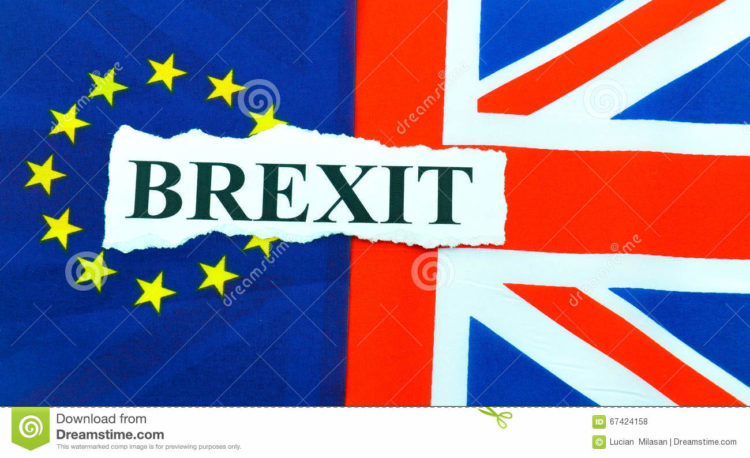Brexit Bulletin: ‘The Biggest Brexit Day Yet’

published Jul 14th 2017, 1:45 am, by Simon Kennedy
(Bloomberg) —
Sign up to receive the Brexit Bulletin in your inbox, and follow @Brexit on Twitter.
Theresa May called Thursday “the biggest Brexit day yet,” and there was certainly much to chew over.
First up was the publishing of the legislation that will remove Britain from the European Union and port 12,000 of the bloc’s laws onto the U.K. statute books.
It immediately ran into criticism from Scotland and Wales, whose leaders called the 66-page bill a “naked power grab” for failing to give them sufficient powers. Scotland will still get a separate vote on the bill.
Opposition parties also prepared to amend the bill, which among other things will give the government power to tweak laws without parliamentary approval and take Britain out of the EU’s human rights charter. The Labour Party’s finance spokesman, John McDonnell, called on May to introduce a “different type of bill.” Politicians are braced for an autumn of squabbling.
Brexit Secretary David Davis said in a BBC interview that the changes “are hardly massive,” and purely “technical changes to make the law work.”
“Those who try to derail this bill are increasing the risk of what they would call ‘hard Brexit,’” Trade Secretary Liam Fox told Bloomberg Television. “We are going to leave the European Union and if we are unable to put the laws in place that provide that stability, we will still leave, we simply will not have the legal framework that we want.”
The Bill
The U.K. also acknowledged for the first time on paper that it will have to pay money to the EU as it withdraws, seeking to damp down a row over the country’s so-called Brexit bill with talks set to resume on Monday.
“The government has been clear that we will work with the EU to determine a fair settlement of the U.K.’s rights and obligations as a departing member state,” Brexit Minister Joyce Anelay, a member of the House of Lords, said Thursday in a written statement to Parliament that referred explicitly to the “financial settlement” with the EU.
“The government recognizes that the U.K. has obligations to the EU, and the EU obligations to the U.K., that will survive the U.K.’s withdrawal — and that these need to be resolved.”
In another sign the U.K. may be giving ground, Fox, a leading advocate for Brexit, said he would be “very happy” with a transitional period although he differed with other members of the government by saying it should be limited to a “few months.”
In a set of position papers, the U.K. also reiterated a plan to leave the Euratom atomic regulator and acknowledged it could be on the hook for payments to it. Davis said Britain may seek associate membership.
The government also reconfirmed it would end the European Court of Justice’s jurisdiction in the U.K.
History Lessons
The U.K. and EU negotiating teams meet again next week in Brussels.
To help out the British side, Ian Wishart of Bloomberg has gone through the history books for lessons on how to engage with the EU’s multiple governments and hulking bureaucracy.
Seven EU negotiations from the bloc’s recent past could give May clues on how to get what she wants on Brexit. They include Greece’s fiscal crisis, Canada’s trade deal and Margaret Thatcher’s rebate.
It won’t make for easy reading though — the EU usually wins.
Brexit in Brief
Labour Party leader Jeremy Corbyn says his meeting with EU negotiator Michel Barnier was “frank and informative” Some Tory MPs are in talks with Labour to keep Britain signed up to free movement after Brexit, the Telegraph reports Women’s groups fear Brexit could roll back decades of progress in equality and rights for working women Aberdeen, Scotland is now Britain’s worst-performing housing market, with concern over prospects for the oil city in the Brexit era London’s biggest law firms are benefiting from the weaker pound as they hunt for growth overseas, Allen and Overy says The U.K. market regulator may ease listing requirements for companies controlled by a sovereign country. That could help woo Saudi Aramco to the London market, boosting post-Brexit London. Britain could easily withstand paying a hefty financial settlement to leave the EU without posing a “big threat” to fiscal sustainability, says the country’s fiscal watchdog Investment firms in the U.K. may have to move more senior workers to the EU after regulators said member states need to consider the size of an asset manager’s business when approving funds and subsidiaries Lionel Laurent of Bloomberg Gadfly says it’s time to ignore Tim Martin, the “pub bore” at the helm of JD Wetherspoon Plc.
And Finally…
Spending by overseas visitors to the U.K. climbed to £4.4 billion ($5.7 billion) in the first quarter, a 15.6 percent increase from a year earlier.
Tourists have likely been encouraged by the pound’s 13 percent drop against the dollar since the referendum.
As to the delicacies people can spend their money on, Hitachi Personal Finance reported that fish and chips costs the least in Blackpool, at £5.19 a serving on average, and the most in London, at £8.90.
For more on Brexit follow Bloomberg on Twitter, Facebook and Instagram
To contact the author of this story: Simon Kennedy in London at skennedy4@bloomberg.net To contact the editor responsible for this story: Adam Blenford at ablenford@bloomberg.net Andy Reinhardt
copyright
© 2017 Bloomberg L.P



No Comment